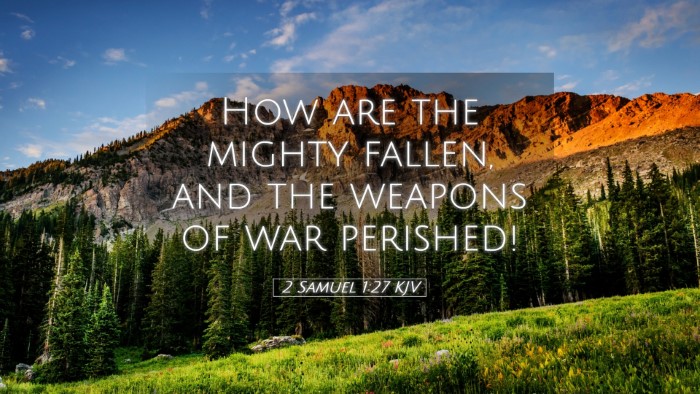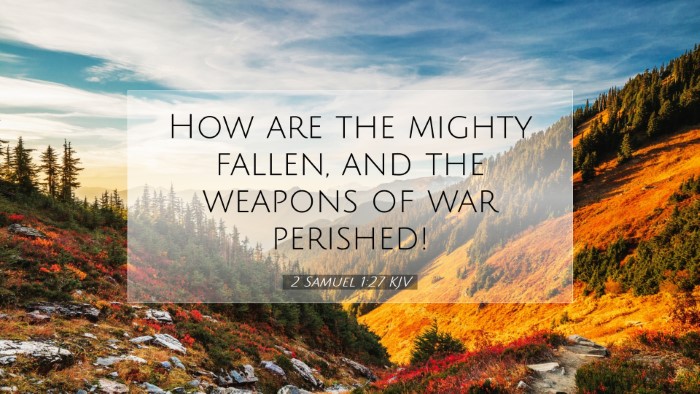Commentary on 2 Samuel 1:27
Verse (2 Samuel 1:27): “How are the mighty fallen, and the weapons of war perished!”
Contextual Overview
This verse is found in the context of David's lament over the death of Saul and Jonathan. It reflects David's profound sorrow and serves as a poetic elegy that captures the tragedy of their fall amidst the glory of their military exploits.
Thematic Insights
Let us explore the implications of this verse, drawing from the insights of well-respected public domain commentaries.
Matthew Henry's Commentary
Reflection on Loss: Matthew Henry emphasizes the poignant sense of loss that is immediate in the lament. He notes that the phrase "How are the mighty fallen" signifies not just the physical death of Saul and Jonathan but also the fall of their stature and influence among the Israelite people. The lament succinctly encapsulates the tragedy of lamenting great men who have now been humbled.
Transition of Power: Furthermore, Henry points out that the end of a dynasty often brings an inevitable shift in power dynamics. The phrase "weapons of war perished" metaphorically speaks to the defeat of strength, signaling that what once commanded respect and struck fear has now been reduced to mere memory. This reflection serves as a critical reminder of the impermanence of human glory and the transient nature of power.
Albert Barnes' Commentary
Highlighting the Glory of the Fallen: Albert Barnes digs deeper into the lament by noting the former splendor and victories of Saul and Jonathan. He highlights how David, in his grief, recognizes the initial promises these men held within Israel's history and the tremendous weight of their legacies. “The mighty fallen” refers to their once-great status, now tragically compromised, which evokes heartfelt mourning and loss.
The Symbolism of Weapons: Regarding "the weapons of war," Barnes suggests that these represent not only physical instruments but also the might and military prowess of Israel that have now been diminished. This loss indicates not just a personal tragedy for David but potentially a national crisis, as the symbols of strength and security are no longer intact.
Adam Clarke's Commentary
Reflection on Human Glory: Adam Clarke, reflecting on the phrase “How are the mighty fallen,” asserts that it carries rich theological significance, suggesting that human strength can be reduced to nothing through varying circumstances. David's lament may be viewed as a prophetic reminder of the unpredictable nature of life and the ways in which those considered 'mighty' can quickly succumb to fate.
Praise Amidst Mourning: Clarke also encourages readers to consider this passage not merely as an elegy, but also as a moment of praise for the contributions made by Saul and Jonathan to the history of Israel. Their lives, full of battles and achievements, should prompt a holy remembrance and serve to inspire future generations in their faith.
Theological Implications
- Understanding Mortality: The verse reminds us of the frailty of man and the ultimate end that befalls all, regardless of their stature. Both faithful and unfaithful can face demise.
- Covenant Relationships: David's lament emphasizes the bonds formed in covenant relationships. The loss of Jonathan profoundly affects David, showcasing the depth of their friendship and covenant as brothers in the Lord.
- The Importance of Legacy: It challenges contemporary readers to reflect on the legacies they are creating. Just as the fall of mighty men impacts the community, so does the legacy of every individual in their own spheres.
- National Consequences of Individual Actions: The lament is not just personal but national. The deaths of Saul and Jonathan herald dreadful implications for Israel. The spiritual state of leaders impacts the collective spiritual health of nations.
Conclusion
In summary, 2 Samuel 1:27 serves as a vital reflection on human existence, power dynamics, and legacy, encouraging faith leaders, scholars, and students alike to ponder the impermanence of worldly strength and the eternal value of relationships and memories. Through the lament of David, we are invited to engage deeply with the stories of those who have gone before and the spiritual narratives that shape us.


